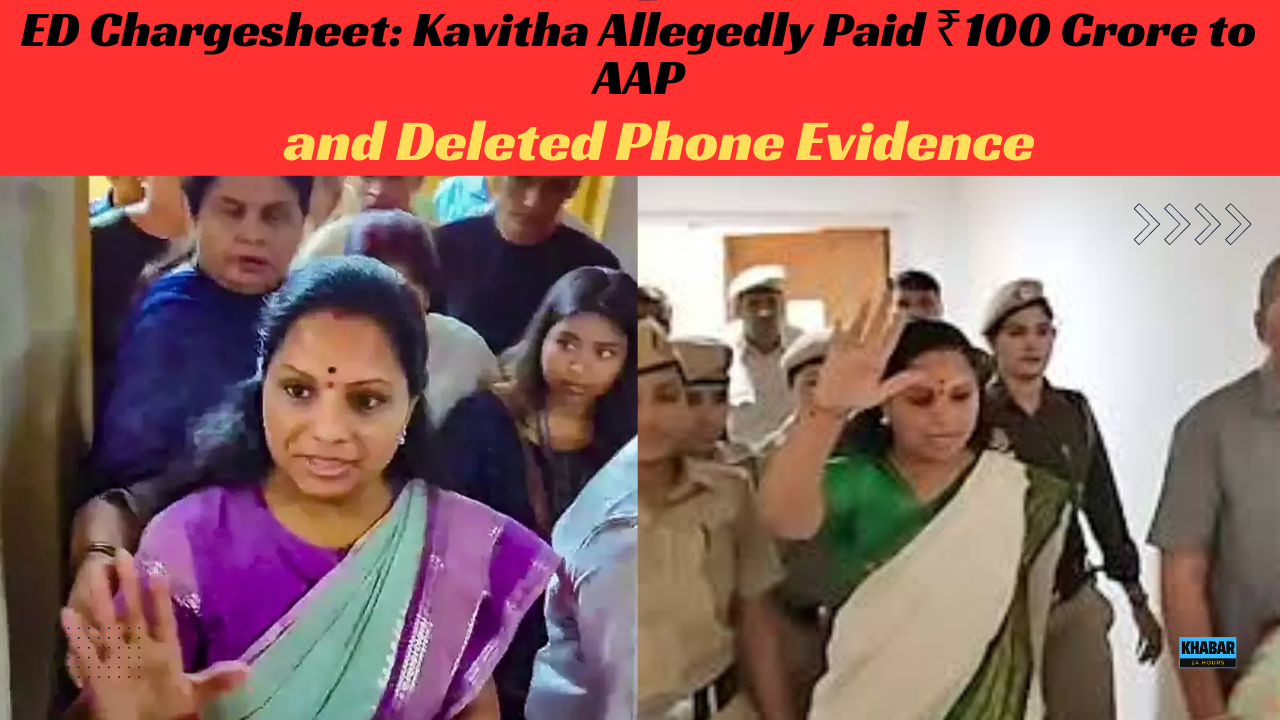In the ongoing Delhi excise policy case, the Enforcement Directorate (ED) has alleged that a total of ₹1,100 crore was laundered through kickbacks and irregularities associated with the policy. The chargesheet accuses several individuals and entities of participating in this extensive money laundering scheme. Key figures implicated include K. Kavitha, who is alleged to have paid ₹100 crore to AAP leaders, and several other businessmen and political leaders who facilitated the transfer and laundering of these funds (The New Indian Express) (The New Indian Express).
The ED’s investigation has revealed that these funds were used to bribe government officials and politicians, primarily from the AAP, to secure favorable modifications in the Delhi excise policy. The chargesheet also names Delhi Chief Minister Arvind Kejriwal and former Deputy CM Manish Sisodia, accusing them of being deeply involved in the scheme (The New Indian Express) (The New Indian Express).

The Enforcement Directorate (ED) has alleged that Bharat Rashtra Samithi (BRS) leader K. Kavitha was involved in laundering nearly ₹300 crore out of the ₹1,100 crore linked to the Delhi excise policy scam. This claim was made in a supplementary chargesheet filed before Special Judge Kaveri Baweja in a Delhi court. The court has extended Kavitha’s judicial custody until July 3. Additionally, the court granted bail to three co-accused—Prince, Damodar, and Arvind Singh—who were chargesheeted but not arrested during the investigation, according to PTI (The New Indian Express) (The New Indian Express).
The ED chargesheet alleges that a total of ₹1,100 crore was laundered in the Delhi excise policy scam. Out of this, the prosecution complaint addresses proceeds of crime worth ₹292.8 crore. The agency claims that through the actions of K. Kavitha, Chanpreet Singh, Prince Kumar, Damodar Sharma, and Arvind Singh, significant proceeds of crime were generated. Specifically, Kavitha, the daughter of former Telangana Chief Minister K. Chandrashekar Rao, is alleged to have been involved in laundering ₹292.80 crore, with ₹100 crore paid as kickbacks to Aam Aadmi Party leaders.
leaders through Vijay Nair, another accused in the case, who was acting on behalf of the top AAP leadership. The conspiracy involved paying ₹100 crore in kickbacks to secure undue benefits (The New Indian Express) (The New Indian Express).

The ED alleges that K. Kavitha was involved in generating, acquiring, and using proceeds of crime amounting to ₹192.80 crore through a conspiracy involving IndoSpirits, an accused company. The agency further claims that Kavitha misrepresented IndoSpirits as a legitimate business entity to acquire these illicit funds (The New Indian Express) (The New Indian Express).
The ED’s chargesheet alleges that K. Kavitha participated in the conspiracy to form IndoSpirits to recover advance bribes of ₹100 crore. By doing so, she was knowingly involved in generating and transferring proceeds of crime (PoC) worth ₹100 crore and in generating, acquiring, and possessing PoC amounting to ₹192.8 crore, disguised as profits generated by IndoSpirits from November 2021 to August 2022. The ED also claims that Kavitha received ₹5.5 crore from IndoSpirits in the name of her aide, Abhishek Boinpally. The central agency arrested Kavitha at her Hyderabad residence on March 15 (The New Indian Express) (The New Indian Express).
The Enforcement Directorate (ED) has accused K Kavitha, a prominent political figure, of destroying digital evidence by allegedly deleting data and formatting her mobile phones. According to the ED, Kavitha presented nine mobile phones for examination, all of which were found to be formatted and devoid of any data. The ED further claims that Kavitha was evasive and failed to provide a satisfactory explanation regarding the formatted phones.
These allegations typically arise in the context of ongoing investigations where digital evidence is crucial. The destruction of such evidence can significantly impact the course of an investigation, as it hinders the authorities’ ability to uncover critical information. In this scenario, the ED’s assertions suggest a deliberate attempt to obstruct the investigative process.
For individuals involved in legal and political matters, the destruction or tampering of evidence can have serious legal repercussions, potentially leading to charges of obstruction of justice or contempt. The legal process will involve further scrutiny and possibly judicial intervention to determine the veracity of these allegations and any potential consequences for Kavitha.
The Enforcement Directorate (ED) has further alleged that K Kavitha was involved in acts of influencing witnesses. This adds another layer of seriousness to the accusations against her, suggesting attempts to obstruct justice beyond the destruction of digital evidence. Witness tampering is a significant offense as it directly impacts the integrity of legal proceedings and the ability to uncover the truth.
The combined allegations of destroying digital evidence and influencing witnesses could have severe legal implications for Kavitha. Such actions, if proven, indicate a concerted effort to impede the investigation and could lead to charges of obstruction of justice, tampering with evidence, and witness intimidation.
ALSO READ : Sonia Gandhi’s initial response to the 2024 exit poll results was simply, “Let’s wait and observe.”
These accusations are likely to prompt the authorities to scrutinize Kavitha’s actions more closely, potentially leading to increased legal scrutiny and possible judicial proceedings. The legal system will need to thoroughly investigate these claims, ensuring due process and a fair trial.
ALSO READ : The Supreme Court registry has turned down Arvind Kejriwal’s request for a one-week extension of his bail.
KNOW MORE ABOUT : K. Kavitha

